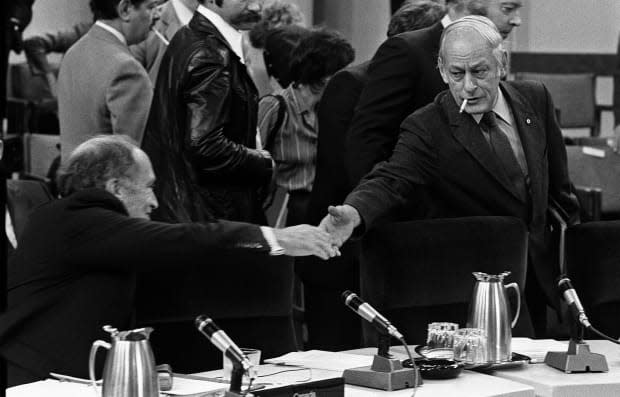In Quebec religious symbols decision, Canada confronts consequences of controversial constitutional clause

In the mythology of Quebec nationalists, the "night of the long knives" refers to an all-night bargaining session at Ottawa's Château Laurier hotel during the constitutional talks in the fall of 1981.
That night, provincial representatives reached an agreement among themselves to support Pierre Trudeau's wide-ranging reforms.
Then Quebec premier René Lévesque, for reasons that are still debated, was not present and felt betrayed, and ultimately refused to sign the Constitution.
But it was at that meeting that the provinces made their support for the reforms contingent on the inclusion of a "notwithstanding clause."
Leery about losing autonomy to a federal charter of fundamental rights, the provinces extracted a compromise from Trudeau allowing them to override parts of the charter for renewable, five-year periods.
Jean Chrétien, who was then Trudeau's justice minister, downplayed its importance at the time. It would only be used to "correct absurd situations," he told the House of Commons.

Indeed, at one point in the 1990s, the clause was so little used that some jurists wondered if it was, effectively, dead. Since then, however, it has been invoked occasionally.
Fast forward to June 2019. Quebec's nationalist premier, François Legault, passes his government's flagship piece of legislation, a ban on religious symbols in large parts of the civil service.
Muslim women, in particular, feel targeted. Civil rights groups accuse the government of discriminating against minorities.
But in passing the Laicity Act, Legault invoked the notwithstanding clause, hoping to protect it from claims the ban violated rights now protected by the Charter of Rights and Freedoms.
And if the law, cherished by Quebec's nationalists, is mostly still intact today, it is largely because of the notwithstanding clause — that bargain agreed to behind Lévesque's back.
Legally violating rights, or saved by the clause
On Tuesday, a Quebec Superior Court judge ruled on the first set of constitutional challenges launched against the Laicity Act, widely known as Bill or Law 21.
In a 240-page decision, Justice Marc-André Blanchard upheld most of the provisions that ban public employees such as teachers, police officers and prosecutors from wearing religious symbols at work.
But at several points, Blanchard also says the law violates the basic rights of religious minorities in the province.
"[Bill 21] brings about serious and negative consequences for all people who display religious symbols in public," he writes at one point.
WATCH | A Sikh teacher reacts to the ruling:
Elsewhere he notes, "the evidence undoubtedly shows that the effects of Law 21 will be felt negatively above all by Muslim women," adding that it violates both their religious freedom and freedom of expression.
The notwithstanding clause, however, prevents the plaintiffs from appealing to those charter rights that protect religious freedom, freedom of expression or gender equality.
As Blanchard explains, it doesn't matter what rights are overridden by the clause. All that matters is that proper procedure is followed when invoking it, which Quebec did.
Among supporters of the law, there was a sense that had it not been for the clause, the ban on religious symbols would have been declared unconstitutional.
"Thanks to the notwithstanding clause, it's the choice of legislator that won out. It's a victory for the notwithstanding clause," said Guillaume Rousseau, a law professor who advised the government on the legislation and represented a pro-secularism group at the trial.
The one, albeit significant, set-back for the pro-Bill 21 side was Blanchard's decision to exempt English schools from the religious symbols ban, citing their minority language education rights.
Those rights, Section 23 in the charter, can't be overridden by the notwithstanding clause.
Law at 'all costs'
Blanchard deferred to legal precedent in his interpretation of what the notwithstanding clause permits. But he also underscored, at length, his reservations about how the Quebec government used it in this case.
In the past, the notwithstanding clause has usually been invoked in cases where a provincial legislature disagreed with a court decision, and a limited number of charter rights were overridden.
Bill 21, however, invoked the clause preemptively, meaning a court is blocked from first determining if a basic rights violation has occurred.
And the law also contains a blanket suspension of all rights in Sections Two and Seven to 15 in the charter, even those rights that have nothing to do with secularism.
Blanchard calls this "troubling," pointing out the law suspends things like the right to a lawyer and lawyer-client privilege.
In seeking to ensure the law applies at "all costs," the government displayed an "indifference toward the rights and liberties of those affected," he said.
Some readers of the decision were left feeling that Blanchard exposed, whether deliberately or not, the far-reaching consequences of the notwithstanding clause.

"He seems to invite … closing some of the holes that he points to in his decision," said Louis-Philippe Lampron, a professor of constitutional law at the Université Laval.
Robert Leckey, a constitutional expert and dean of the McGill law faculty, said the decision highlights the fragility of minority rights in Canada when "a legislature doesn't have the instinct to check its power."
He said increasing accountability around use of the notwithstanding clause wouldn't necessarily require a constitutional amendment.
Courts could, for example, declare if a law protected by the notwithstanding clause has violated rights. The law would still stand, but a court's comments could "affect the political calculus" behind invoking the clause, Leckey said.
But altering the scope of the notwithstanding clause would endanger that bargain at the heart of the constitutional compromise struck in 1981, said Patrick Taillon, a law professor at Université Laval who testified for the Quebec government at the Bill 21 trial.
At its core, that bargain was about giving elected legislators — not judges — the final say over how society should be governed.
"We might be in an era when public trust in politicians is eroding. But what's the alternative? The judge is always right in all circumstances?" Taillon said. "We have to think twice about that."

